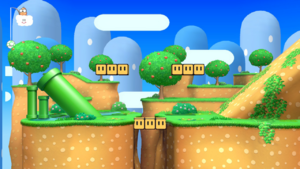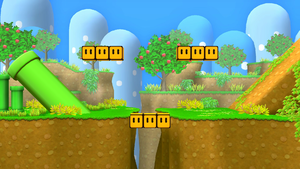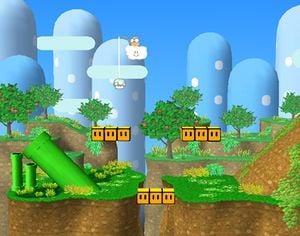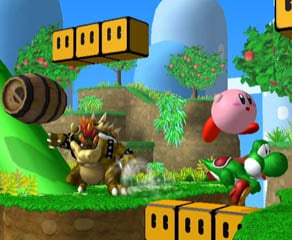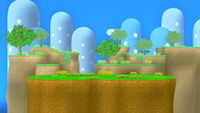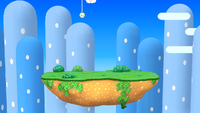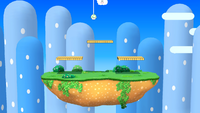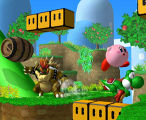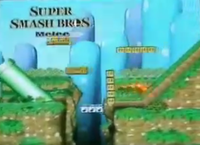Yoshi's Island (SSBM): Difference between revisions
Tag: Mobile edit |
m (→Stage overview) |
||
| Line 41: | Line 41: | ||
If characters attack a block or jumps into it from below, the block starts spinning and can be passed through, becoming solid again after a short while. This can cause fighters to get trapped in the pit in the middle with little chances of recovery, especially in {{SSBM|Ness}}'s case. | If characters attack a block or jumps into it from below, the block starts spinning and can be passed through, becoming solid again after a short while. This can cause fighters to get trapped in the pit in the middle with little chances of recovery, especially in {{SSBM|Ness}}'s case. | ||
The background features hills, moving clouds, berry trees and, occasionally, a [[Banzai Bill]] and a {{s|mariowiki|Fishin' Lakitu}} carrying a 1-up Mushroom with their ''[[Super Mario World]]'' sprites (in ''Ultimate'', they appear using | The background features hills, moving clouds, berry trees and, occasionally, a [[Banzai Bill]] and a {{s|mariowiki|Fishin' Lakitu}} carrying a 1-up Mushroom with their ''[[Super Mario World]]'' sprites (in ''Ultimate'', they appear using depixelated versions of said sprites). They have no effect on gameplay. | ||
In ''Brawl'', playing as {{SSBB|Fox}}, {{SSBB|Falco}}, or {{SSBB|Wolf}} and activating the [[Landmaster]] [[Final Smash]] when at least one of the three Turning Blocks in the middle rotates causes the Landmaster to fall through the resulting hole, causing a [[Self-destruct]], despite the fact that the Landmaster is much bigger than the opening. This is because the programming means the actual character is still on the field and the characters cannot stand in midair. The Pokémon Trainer also occasionally moves above the hole, even though there is clearly nothing under him. | In ''Brawl'', playing as {{SSBB|Fox}}, {{SSBB|Falco}}, or {{SSBB|Wolf}} and activating the [[Landmaster]] [[Final Smash]] when at least one of the three Turning Blocks in the middle rotates causes the Landmaster to fall through the resulting hole, causing a [[Self-destruct]], despite the fact that the Landmaster is much bigger than the opening. This is because the programming means the actual character is still on the field and the characters cannot stand in midair. The Pokémon Trainer also occasionally moves above the hole, even though there is clearly nothing under him. | ||
Revision as of 11:20, September 24, 2024
| Super Mario World Yoshi's Island: Yoshi's Island Yoshi's Island (Melee) | |
|---|---|
Yoshi's Island as it appears in Smash. | |
| Universe | Yoshi |
| Appears in | Melee Brawl SSB4 (Wii U) Ultimate |
| Availability | Starter |
| Crate type | Presents (Brawl) Normal (Wii U and Ultimate) |
| Maximum players | 4 (Melee and Brawl) 8 (Wii U and Ultimate) |
| Article on Super Mario Wiki | Yoshi's Island (place) |
Announced at E3 2001, Yoshi's Island (ヨースター島, Yoster Island) is a starter stage in Super Smash Bros. Melee, also available as a Melee Stage in Super Smash Bros. Brawl and a Familiar Stage in Super Smash Bros. for Wii U and Super Smash Bros. Ultimate.
In Ultimate, it is renamed Yoshi's Island (Melee) to distinguish it from the similarly named Brawl stage.
It acts as Yoshi's home stage in all games, and players face Bowser and his teammates on the stage in Melee's All-Star mode.
In Super Smash Bros. for Wii U, both the normal form and Ω form of this stage are available in 8-Player Smash.
Stage overview
The battle takes place in a grassland valley. On the far right of the stage there is a hill sloping upwards which reaches the right blast line. On the left there is a large, oblique Warp Pipe supported by two smaller ones. Between them there is a flat stretch of land at whose center there is a pit covered by three Rotating Blocks. Six more blocks float over the stage in two blocks of three.
If characters attack a block or jumps into it from below, the block starts spinning and can be passed through, becoming solid again after a short while. This can cause fighters to get trapped in the pit in the middle with little chances of recovery, especially in Ness's case.
The background features hills, moving clouds, berry trees and, occasionally, a Banzai Bill and a Fishin' Lakitu carrying a 1-up Mushroom with their Super Mario World sprites (in Ultimate, they appear using depixelated versions of said sprites). They have no effect on gameplay.
In Brawl, playing as Fox, Falco, or Wolf and activating the Landmaster Final Smash when at least one of the three Turning Blocks in the middle rotates causes the Landmaster to fall through the resulting hole, causing a Self-destruct, despite the fact that the Landmaster is much bigger than the opening. This is because the programming means the actual character is still on the field and the characters cannot stand in midair. The Pokémon Trainer also occasionally moves above the hole, even though there is clearly nothing under him.
Ω forms and Battlefield form
In Super Smash Bros. for Wii U, the Ω form only contains a flat grassy platform that extends below the blast line. The blocks, pipes, and the walk-off are removed, but the Fishin' Lakitu and Banzai Bill still appear.
In Super Smash Bros. Ultimate, the Ω form and Battlefield form are suspended in the air with the main platform no longer extending below the blast line. The main platform is a completely flat version of the grassy ground of the regular form that is resized and reshaped to match Final Destination and Battlefield, respectively. The three soft platforms of the Battlefield form are made of yellow blocks that are unique to this form.
Hazards Off
With hazards off in Ultimate, the Rotating Blocks do not have a hurtbox, making it impossible to pass through them or fall into the center pit.
Origin
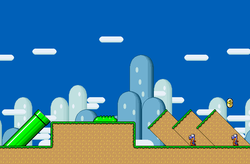
Despite being classified as a Yoshi stage, this version of Yoshi's Island originated from a Mario game, that being Super Mario World. This stage is based on the grassland levels located on Yoshi's Island, which feature round-topped mountains, berry trees, long rounded clouds, and diagonal Warp Pipes.
Rotating Blocks are Super Mario World's replacement of the usual Brick Blocks seen in Mario games. If hit from underneath, with a throwable object, or with a cape spin, they start spinning and allow Mario to pass through them, returning solid after a short while. However, they can also be destroyed with a Spin Jump.
The trees in the background carry Berries, which Yoshis can eat in Super Mario World and later games. Also in the background are two enemies from Super Mario World in their original designs: Banzai Bill and Fishin' Lakitu with a 1-Up Mushroom.
Tournament legality
In all games in which it appears, Yoshi's Island is universally banned in competitive play due to its overall layout being detrimental in a serious setting, as well as the advantages it gives to already powerful characters in certain situations.
In all cases, the close blast zones and the walk off blast line to the right of the stage can easily cause quick KOs; the frequent absence of a bottom blast line also marginalizes edgeguarding skills. The rotating blocks interfere significantly by extending and blocking hitboxes, and they can be used as a cave of life.
Both of the ramps that border this stage also allow Melee Fox to easily and quickly shine combo characters to an unavoidable KO, giving the top-tier character an obscene advantage.
Gallery
Super Smash Bros. Melee
Super Smash Bros. Brawl
Ice Climbers and Diddy Kong on Yoshi's Island.
Super Smash Bros. for Wii U
Super Smash Bros. Ultimate
Pichu and Pikachu taunting with Alolan Raichu on the stage.
Banjo & Kazooie sprinting on the stage.
Names in other languages
Trivia
- During the development of Melee, the whole stage was originally going to be a big stage with the pit being larger, nearly covered by three Note Blocks, and would have a stack of five jumping blocks on the right side of the pit. There were originally three platforms (one made of five rotating blocks and two made of three rotating blocks) inserted in completely different areas of the stage, and there were no trees in the background.
- The trophy of Metal Mario in Melee, if inspected closely, reflects a still image of this stage.
- Super Mario World did have large diagonal pipes like the one on the left of this stage; however, all of them are angled up and to the right, unlike this one which angles up and to the left.
- The Spinning Blocks, when inert, have a three-dimensional look; however, when they are hit and start spinning, they become two-dimensional. The blocks are also two-dimensional before the match starts.
- In Brawl, if Pit performs his Final Smash, Palutena's Army, on this stage, the clouds will continue to move in front of Palutena's face.
- Although Super Mario World was part of the main Mario series, in the Smash Bros. series this stage is part of the Yoshi universe. However, all Yoshi universe properties can also be considered part of the Mario universe, due to Yoshi having first appeared in a Mario game, and appearing in various others (especially sports titles and the Mario Party series) since then. In addition, the game most often considered first mainline Yoshi game, Yoshi's Island, was also billed as "Super Mario World 2", meaning World could be considered the genesis of Yoshi's spinoff series. Consequently, some of the stage's music tracks are from the main Mario series, and it is used as a home stage for some of the Mario characters in Melee. With Ultimate grouping music tracks according to the universe they come from, however, tracks from the Mario universe can no longer be played in this stage.
- If a player hangs on to one of the edges of the middle hole, the spinning block whose space they occupy will not stop spinning until the player leaves the space.
- In Melee, if AI players in Training mode are set to Walk when standing on the spinning blocks, they won't move and instead spin in circles changing directions, as if dancing. When walking right on the right side of the middle blocks, they will also walk into the blast line and self-destruct.
- In Ultimate, Devil and Rathalos can only be summoned on the stage's Battlefield and Omega forms. Additionally, Abra and Marshadow can only be summoned on the Battlefield and Omega forms.
- In Ultimate, the ground's collision on the right side of the stage starts going up and diagonally right to match the stage's geometry, however the collision becomes less steep about halfway between the camera bounds and the blast line while the geometry maintains its angle. This results in characters appearing to be inside the ground and can be seen by angling the camera to look to the right. [1]
External links
References
| Stages in Super Smash Bros. Melee | |
|---|---|
| Starter stages | Brinstar · Corneria · Fountain of Dreams · Great Bay · Green Greens · Icicle Mountain · Jungle Japes · Kongo Jungle · Mushroom Kingdom · Mute City · Onett · Pokémon Stadium · Princess Peach's Castle · Rainbow Cruise · Temple · Venom · Yoshi's Island · Yoshi's Story |
| Unlockable stages | Battlefield · Big Blue · Brinstar Depths · Final Destination · Flat Zone · Fourside · Mushroom Kingdom II · Poké Floats |
| Dream Land · Kongo Jungle · Yoshi's Island | |
|
| |
|---|---|
| Fighter | Yoshi (SSB · SSBM · SSBB · SSB4 · SSBU) |
| Stages | Super Happy Tree · Yoshi's Story · Yoshi's Island (SSBM) · Yoshi's Island (SSBB) · Woolly World |
| Enemies | Shy Guy · Fly Guy |
| Other | Kamek |
| Trophies, Stickers, and Spirits | Trophies (SSBM · SSBB · SSB4) · Stickers · Spirits |
| Music | Brawl · SSB4 · Ultimate |
| Masterpiece | Yoshi |
| Related universe | Mario |
